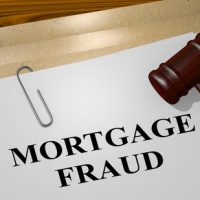Mortgage Fraud Is On The Rise

Mortgage fraud is unfortunately on the rise as one of the top consumer law violations – specifically, income and property value fraud. Mortgage fraud can occur when lenders prey on unsuspecting consumers in order to falsely inflate the value of property to obtain equity or cash from homeowners or lenders. It can also come in the form of a mortgage loan modification, or assistance to a borrower in refinancing their mortgage with the goal of making a profit from it.
Fraudulent Mortgage Loan Modifications
For example, struggling homeowners potentially facing foreclosure can sometimes be tricked by these entities into believing that they can renegotiate the terms and save their home in exchange for a fee, or a fake buyer or investor might offer to take over the mortgage payments to help a homeowner avoid foreclosure in exchange for the homeowner signing over the title to the home. Unfortunately, the mortgage payments are never made to the lender, and the home is then foreclosed on, sometimes even after the homeowner themselves have even been paying rent to the fraudulent entity. This type of fraud can also involve the fraudulent entity refinancing the home themselves and benefitting from the equity built over time.
How To Protect Yourself
Keep the following information in mind in avoiding mortgage loan modification fraud:
- Only your mortgage servicers can grant mortgage loan modifications, not third parties
- Fees cannot be charged in advance for mortgage modifications
- Paying third parties for assistance with mortgage loan modifications does not improve your chances of obtaining the modification
- Always verify whether or not an independent company is affiliated with a government agency, if they claim to be
- Never trust “money-back guarantees”
- Never trust any entity that advises you to stop making mortgage payments or avoid contacting your service provider
- Looking at the property tax assessment can help confirm how much the property is worth
- Make sure that any and all documentation associated with your mortgage application is accurate and nothing has been left blank so as to allow someone to go in and fill this information in later
- Checking the title history can help you to ensure that the property’s value has not been falsely inflated or the property has not been illegally sold
Let Us Help You Today
You should never sign any mortgage or real estate documents that you do not understand or are uncomfortable with. Also keep in mind that mortgage fraud can at times even involve identity theft, where a consumer’s birth date, credit information, social security number, etc. are used to apply for a loan.
If you or a loved one has been the victim of a consumer law, or has any real estate law questions, contact our Columbus consumer law attorneys at the Kohl & Cook Law Firm LLC to find out how we can help.
Source:
nasdaq.com/articles/how-to-avoid-mortgage-fraud
